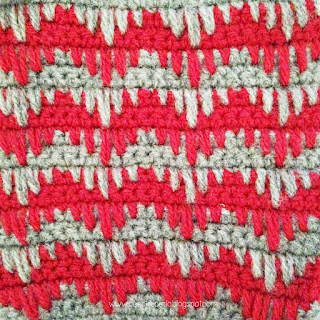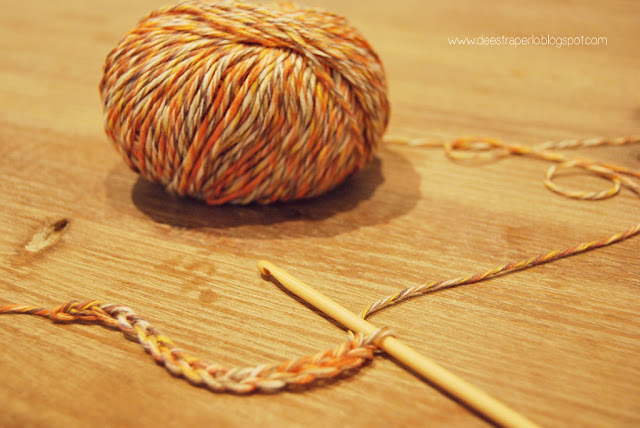I grew up in Barcelona, and we used to spend our weekends and holidays in the mountains, close to El Montseny. You know that saying " you don't know what you have until you lose it", right? Well, I wasn't really aware of how awesome autumns were there. However, from then on, when autumn begins, I remember those days with nostalgia; the fireplace, la castanyada, looking for mushrooms in the forest...
Cuando vivía en Barcelona solíamos pasar los fines de semana y vacaciones en la montaña, cerca del Montseny. Entre que era muy pequeña y aquello típico de que no aprecias lo que tienes hasta que dejas de tenerlo, yo no era consciente de lo maravillosos que eran los otoños ahí. Sin embargo, desde entonces, siempre que llega esta época del año recuerdo con nostalgia esos años; la chimenea, la castanyada, buscar setas, los paseos por el bosque con chubasquero y botas...
I was with my brother the other day, talking about all this stuff and remembering anecdotes, such as the time when my father went to look for mushrooms and he found himself surrounded by a wild boar hunting! As a result of this conversation, my brother came up with this illustration of Minus in a very autumny outfit. I just love it.
El otro día hablaba de ello con
mi hermano, mientras los dos recordábamos anécdotas de esa época, como aquella vez que mi padre estaba recogiendo setas y sin comerlo ni beberlo se encontró en medio de una cacería de jabalí, aterrorizado detrás de un arbusto, sin moverse para que no le confundieran con uno y "adiós papá, adiós papá...". A raíz de esa conversación, mi hermano se presentó con este dibujo de un Minus otoñal, paseando con su chubasquero y sus botas entre hojas secas. Me encanta.
I haven't had the chance to go to the mountains this year yet, but I hope to go soon. What I'm actually doing is filling myself up with pumpkins and sweet potatoes.
So, a few weeks ago, when I discovered this yarn, with this totally autumn vibes, I just couldn't resist and I had to think of a nice project to use it. I'm not a huge fan of these yarns that change colours, even less if it's to work with crochet, but sometimes I found one or another that I like, and then... then I love it.
I wanted a very simple project but not with the traditional stitches such as single crochet, double crochet... because I knew that I wasn't going to enjoy the look of it. That's why I decided to use tunisian crochet. It offers a look similar to knitting or weaving and it's also very pretty and fun to make.
Autumn in Madrid is also very nice, isn't it?
Este año aún no he tenido oportunidad de ir a la montaña, pero espero hacerlo dentro de poco. Lo que si estoy haciendo es hincharme a comer calabazas y boniatos, en cremas, sopas, pasteles, y demás formatos posibles.
Por todo esto, cuando el otro día descubrí este hilo con estos tonos tan otoñales, no pude resistirme y tuve que buscar un proyecto en el que usarlo. No me suelen gustar mucho los hilos que van cambiando de color, y menos aún para ganchillo, pero de vez en cuando encuentro alguno que me llama la atención.
Quería un proyecto sencillo y que no fuese con los puntos tradicionales como punto bajo, alto, etc... ya que sabía que no me iba a gustar el resultado final con este hilo. Por ello me decidí por el ganchillo tunecino, que ofrece un acabado más similar a las dos agujas o a un telar y además es precioso y muy divertido de tejer.
The project itself is so easy and practical you won't believe it, a table mat for your Autumn meals, Thanksgiving maybe...? Do you have some friends over for dinner and you want to brag about your amazing pumpkin soup? Serve it with this table mats to make it even more perfect. Are you in?
MATERIALS:
- 150 gr of cotton yarn (I've used 3 skeins of Katia COTTON VINTAGE in orange-brown-mustard)
- Tunisian crochet hook, 4.00 mm
- Scissors
- Tapestry needle
PROCESS
1. Chain 60. (It was enough to me, just make more if you need it)
2. Keep making rows in tunisian crochet until you reach the desired length, about 50cm.
3. Add some fringe to both sides.
El proyecto en sí, nada más sencillo y práctico, un
mantel individual para tus comidas y cenas otoñales. Que vienen tus amigos a cenar y quieres presumir con tu crema de calabaza, que te sale mejor que a nadie? Acompáñala con estos mantelitos para que sea más perfecta aún. Yo por ahora sólo he hecho uno, pero mi intención es hacer cuatro. Otra idea es hacer uno más largo, en plan camino de mesa. Te animas?
MATERIALES:
- 150 gr de hilo de algodón (Yo he usado 3 ovillos de Katia COTTON VINTAGE en naranja-marrón-mostaza)
- Aguja de ganchillo tunecino de 4,00 mm (te recomiendo usar una un número mayor del indicado para el hilo que hayas escogido.)
- Tijeras
- Aguja lanera
PROCESO
1. Haz una cadeneta base de 60 puntos. (Para mi han sido suficientes, si tú lo quieres más ancho dale más cadenetas)
2. Teje con ganchillo tunecino hasta que alcances unos 50 cm. (De nuevo, para mi esta es la anchura que me convenía, tú adáptalo a tus necesidades)
3. Añade flecos en los laterales.
HOW TO MAKE TUNISIAN CROCHET
CÓMO TEJER GANCHILLO TUNECINO
1. Make a regular chain stitches row.
1. Teje una fila de cadenetas normales.
2. Insert the hook in the second chain from hook, yarn over and pull up a loop, as if you were making a single crochet. Now insert the hook in the second chain and repeat. Work this way until the last chain.
2. Inserta el gancho en la segunda cadeneta después del gancho, coge hebra y sácala. Hasta aquí es igual que como si fueses a hacer un punto bajo. Ahora entra en la siguiente cadeneta y haz lo mismo. Así hasta llegar a la última cadeneta.
3. Chain 1. Don't turn over your work! Yarn over and pull up a loop through the two first loops on your hook. Yarn over again and pull a loop through the two next loops on your hook. Repeat until the end of the row.
3. Haz una cadeneta. No gires la labor! Coge hebra y sácala por las dos primeras lazadas. Vuelve a coger hebra y sácala por las dos siguientes. Repite hasta que sólo quede una lazada en el gancho.
4. You'd see that there are vertical loops, you can see it on the picture as well despite being a mottled yarn. Remember not to turn over your work, insert the hook in the second vertical loop, yarn over and pull up a loop. Repeat until end. Don't miss the last vertical loop, it's not always very easy to see.
Now repeat rows 3 and 4 until you reach the desired lenght.
4. Observa que en tu labor han quedado unas lazadas verticales, en la foto, a pesar de ser una lana jaspeada, se ven claramente. De nuevo sin girar la labor, introduce el gancho por la segunda, coge hebra y sácala. Repite la misma acción hasta llegar al final. Ojo con la última lazada, que puede quedar disimulada y no la ves!.
Ahora repite las filas 3 y 4 hasta que alcances el tamaño deseado.
HOW DO I MAKE THE FRINGE?
CÓMO PONGO LOS FLECOS?
Cut two scraps of yarn per fringe (stitch), around 30 cm each. Insert the hook in the stitch where you want to place the fringe, fold the scraps and pull them up through the stitch with the help of the hook. Now make a knot pulling the ends through the loop you've just created. Repeat all the process every other stitch. Once you've all your scraps knotted, trim the ends with a scissor.
Corta dos trozos de hilo de 30 cm por fleco. Inserta la aguja en el punto donde quieras los flecos, dobla los hilos por la mitad y sácalos con la aguja por el punto, creando una lazada. Ahora haz un nudo sacando los cabos por la lazada que has creado. Repite la acción un punto si uno no. Una vez tengas todos los flecos anudados, iguala las puntas a tu gusto.
Oh, so you weren't here for the table mat but for the pumpkin cream recipe? Ah, ok, didn't know! Let's go for it then:
Ah, que lo que querías era la receta de la crema de calabaza? Anda, pues haberlo dicho antes! Espera que voy:
MY PUMPKIN SOUP
MI CREMA DE CALABAZA
Ingridients:
- 400 or 500 gr of pumpkin
- A quite ripe tomato
- One onion
- A small potato
- A big carrot or two small carrots
- Olive oil
- Salt to taste
Method:
- Add the chopped onion to a saucepan with olive oil and sautee until translucent.
- Add the potato and the carrot, peeled and cut in dices, sautee 3, 4 more minutes.
- Add the pumpkin, peeled and cut in dices and the tomato.
- Add water to cover. You can add more water if you like the soup to be more liquid.
- Add salt to taste.
- Cook for 30 minutes and blend in a food processor.
Tips:
- You can add a tbsp of hummus.
- If the pumpkin have seeds, don't throw them away. Clean them and roast them in the oven for 10 or 15 minutes, depending on the size of the seeds.
Ingredientes:
- Un buen trozo de calabaza, 400 o 500 gr
- Un tomate madurito
- Una patata pequeña
- Una cebolla
- Una zanahoria grande o dos pequeñas
- Aceite de oliva
- Sal al gusto
Preparación:
- Corta la cebolla y rehógala un poco en aceite hasta que esté doradita.
- Añade la patata y la zanahoria peladas y cortadas en trozos no muy pequeños. Dales un golpecito de calor junto con la cebolla, 3 o 4 minutos, no más.
- Añade la calabaza pelada y cortada en trozos no muy grandes, y el tomate.
- Añade agua hasta cubrir. Si te gusta más líquida le puedes añadir un poco más de agua, eso ya como tú quieras.
- Sal al gusto.
- Tenlo en el fuego unos 30 minutos y a batir bien. Para mi el truco es que esté bien, bien, bien batido todo.
Truquis:
- Si tienes hummus ponle una cucharadita antes de batirlo todo.
- Si tiene semillas no las tires, lávalas y ponlas un rato en el horno a fuego bajo con un poco de sal. Puedes poner unas pocas para servir la crema. Si son pequeñas se comen con cáscara y todo, están buenísimas!
More crochet ideas for Autumn:
Más proyectos otoñales de ganchillo:






























































